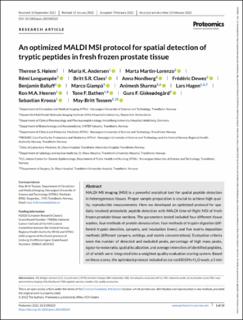| dc.contributor.author | Høiem, Therese Stork | |
| dc.contributor.author | Andersen, Maria Karoline | |
| dc.contributor.author | Martin-Lorenzo, Marta | |
| dc.contributor.author | Longuespée, Rémi | |
| dc.contributor.author | Claes, Britt S.R. | |
| dc.contributor.author | Nordborg, Anna | |
| dc.contributor.author | Dewez, Frédéric | |
| dc.contributor.author | Balluff, Benjamin | |
| dc.contributor.author | Giampà , Marco | |
| dc.contributor.author | Sharma, Animesh | |
| dc.contributor.author | Hagen, Lars | |
| dc.contributor.author | Heeren, Ron M.A. | |
| dc.contributor.author | Bathen, Tone Frost | |
| dc.contributor.author | Giskeødegård, Guro F. | |
| dc.contributor.author | Krossa, Sebastian | |
| dc.contributor.author | Tessem, May-Britt | |
| dc.date.accessioned | 2023-01-16T13:30:47Z | |
| dc.date.available | 2023-01-16T13:30:47Z | |
| dc.date.created | 2022-05-02T15:19:06Z | |
| dc.date.issued | 2022 | |
| dc.identifier.citation | Proteomics. 2022, 22 (10), 1-13. | en_US |
| dc.identifier.issn | 1615-9853 | |
| dc.identifier.uri | https://hdl.handle.net/11250/3043760 | |
| dc.description.abstract | MALDI MS imaging (MSI) is a powerful analytical tool for spatial peptide detection in heterogeneous tissues. Proper sample preparation is crucial to achieve high quality, reproducible measurements. Here we developed an optimized protocol for spatially resolved proteolytic peptide detection with MALDI time-of-flight MSI of fresh frozen prostate tissue sections. The parameters tested included four different tissue washes, four methods of protein denaturation, four methods of trypsin digestion (different trypsin densities, sprayers, and incubation times), and five matrix deposition methods (different sprayers, settings, and matrix concentrations). Evaluation criteria were the number of detected and excluded peaks, percentage of high mass peaks, signal-to-noise ratio, spatial localization, and average intensities of identified peptides, all of which were integrated into a weighted quality evaluation scoring system. Based on these scores, the optimized protocol included an ice-cold EtOH+H2O wash, a 5 min heating step at 95°C, tryptic digestion incubated for 17h at 37°C and CHCA matrix deposited at a final amount of 1.8 μg/mm2. Including a heat-induced protein denaturation step after tissue wash is a new methodological approach that could be useful also for other tissue types. This optimized protocol for spatial peptide detection using MALDI MSI facilitates future biomarker discovery in prostate cancer and may be useful in studies of other tissue types. | en_US |
| dc.language.iso | eng | en_US |
| dc.publisher | John Wiley & Sons, Ltd | en_US |
| dc.rights | Navngivelse 4.0 Internasjonal | * |
| dc.rights.uri | http://creativecommons.org/licenses/by/4.0/deed.no | * |
| dc.subject | proteomics | en_US |
| dc.subject | prostatetissue | en_US |
| dc.subject | peptides | en_US |
| dc.subject | MALDI mass spectrometry imaging | en_US |
| dc.subject | fresh frozen | en_US |
| dc.title | An optimized MALDI MSI protocol for spatial detection of tryptic peptides in fresh frozen prostate tissue | en_US |
| dc.title.alternative | An optimized MALDI MSI protocol for spatial detection of tryptic peptides in fresh frozen prostate tissue | en_US |
| dc.type | Peer reviewed | en_US |
| dc.type | Journal article | en_US |
| dc.description.version | publishedVersion | en_US |
| dc.rights.holder | © 2022 The Authors.Proteomics published by Wiley-VCH GmbH. | en_US |
| dc.source.pagenumber | 1-13 | en_US |
| dc.source.volume | 22 | en_US |
| dc.source.journal | Proteomics | en_US |
| dc.source.issue | 10 | en_US |
| dc.identifier.doi | 10.1002/pmic.202100223 | |
| dc.identifier.cristin | 2020768 | |
| dc.relation.project | Sigma2: NN9036K | en_US |
| dc.relation.project | Sigma2: NS9036K | en_US |
| dc.relation.project | EC/H2020/758306 | en_US |
| dc.relation.project | Norges forskningsråd: 248810 | en_US |
| cristin.ispublished | true | |
| cristin.fulltext | original | |
| cristin.qualitycode | 1 | |

